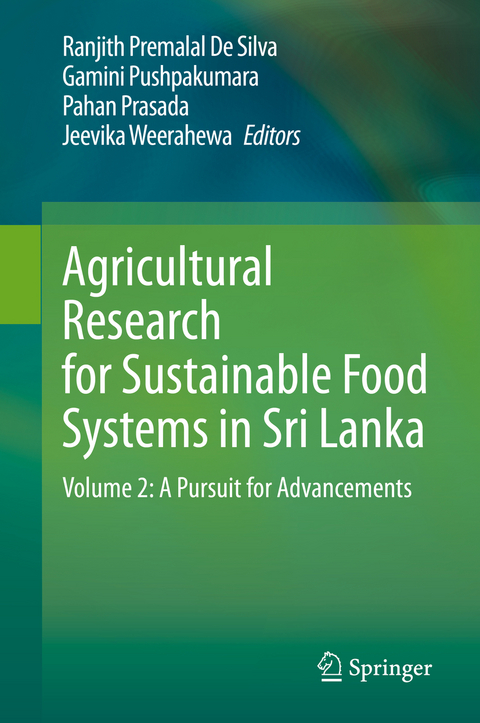
Agricultural Research for Sustainable Food Systems in Sri Lanka
Springer Verlag, Singapore
978-981-15-3672-4 (ISBN)
Food systems deliver optimal performance when the policy and regulatory environment is conducive, institutions are supportive, and a combination of agricultural research investments and an efficient extension system generates the technologies and scientific evidence required for sound policymaking and agenda setting. Further, agricultural research can generate essential findings, technologies and policies for sustainable agricultural development – across disciplines, sectors and stakeholder groups. This book shares valuable insights into research conducted in the broad food and agriculture sectors in Sri Lanka. It also discusses the status quo in related disciplines, and outlines future research directions. Accordingly, it offers a valuable source of reference material for researchers, students, and stakeholders in the food and agriculture sectors, while also highlighting the types of support that policymakers and other decision-makers can provide.
Chief Editor – Dr. Ranjith Premalal De Silva Dr. Ranjith Premalal De Silva is a Senior Professor in Agricultural Engineering at the Department of Agricultural Engineering, University of Peradeniya, Sri Lanka. He holds a B.Sc. degree in Agriculture from the University of Peradeniya, M.Sc. degree from Asian Institute of Technology, Thailand and a Ph.D. in Applied Remote Sensing and GIS from the Cranfield University, UK. He is the Founder President of the geo-informatics Society of Sri Lanka. He is a former Vice Chancellor of Uva Wellassa University, Sri Lanka and Competent Authority of Trincomalee Campus. He has served in many national institutions and also contributed as a consultant for FAO, WFP, World Bank. He is presently serving as the Competent Authority of University of Vocational Technology and Director/ CEO of Hector Kobbekaduwa Agrarian Research and Training Institute. Editor 1 – Dr. DKNG Pushpakumara Professor Gamini Pushpakumarais a Senior Professor and former Head of the Department of Crop Science is the current Dean of the Faculty of Agriculture, University of Peradeniya. He holds B.Sc. degree in Agriculture from the University of Peradeniya, and a M.Sc. and Ph.D. degrees in Forestry and its Relation to Land Use and Forest genetics and Germplasm Conservation, respectively from the University of Oxford, UK. Prof. Pushpakumara is an internationally recognized researcher with over 200 publications in peer reviewed journals. Editor 2 – Dr. DVP Prasada Dr DVP Prasada is a Senior Lecturer at the Department of Agricultural Economics and Business Management, Faculty of Agriculture, University of Peradeniya, Sri Lanka. He holds B.Sc. in Agriculture from the University of Peradeniya, MSc in Agricultural Economics and International development from the University of Guelph, Canada and PhD from the University of New South Wales, Australia. He is also a Fellow of the Adaptation Finance Fellowship Program of Frankfurt School-UNEP Centre. Editor 3 - Dr. Jeevika Weerahewa Dr. Jeevika Weerahewa is a Professor of Agricultural Economics at the Department of Agricultural Economics and Business Management, Faculty of Agriculture, University of Peradeniya, Sri Lanka. She holds B.Sc. and M.Phil. degrees in Agriculture from the University of Peradeniya, and a Ph.D. in Agricultural Economics from the University of Guleph, Canada. She has served as President of the Sri Lankan Agricultural Economics Association.
1) Agriculture Scientist’s Many Burdens: A Glimpse of Efforts in Land Use Planning, Waste Recycling, Food Storage Design, Managing Farmer Psychology and Other Eclectic Pursuits.- 2)Crop Wild Relatives: An Underutilized Genetic Resource for Improving Agricultural Productivity and Food Security.- 3) Utilizing Neglected Crop Genetic Resources for Food and Nutritional Security: Special Reference to Indigenous Vegetables of Sri Lanka.- 4) Shade in Tea Plantations: A New Dimension with an Agroforestry Approach for a Climate Smart Agricultural Landscape System.- 5) Use of Biotechnology for Crop Improvement in Sri Lanka: Current Status and Future Prospects.- 6) Use of Biotechnology for Crop Improvement in Sri Lanka: Current Status and Future Prospects.- 7) Microbial Pesticides towards Eco-Friendly Agriculture: Present Status and Future Prospects in Sri Lanka.- 8) Microbial Pesticides towards Eco-Friendly Agriculture: Present Status and Future Prospects in Sri Lanka.- 9) Paddy Field and Constructed Wetland: The Equivalencies.- 10) Paddy Field and Constructed Wetland: The Equivalencies.- 11) Geo-informatics: Contribution from Spatial Sciences for Agricultural Development and Food Security.- 12) Experiences of Biochar Applications for Sustainable Agriculture in Sri Lanka.- 13) Taking Trans Fats Out of the Food Supply.- 14) Functional Foods and Health.- 15) ICT Based Information Systems in Agricultural Extension and their Economic Implications: Sri Lankan Perspectives.- 16) Public – Private- Producer (PPP) Partnerships in Sri Lankan Agriculture.- 17) Role of Emotional Intelligence and Interpersonal Relations in Managing the Outcomes of Agricultural Extension and Advisory Services.- 18) Communication Approaches in Agricultural Extension towards Achieving Sustainable Food Systems in Sri Lanka.- 19) A Psychological Lens to Conceptualize Sri Lankan Farmers’ Adaptation Behavior in the Face of Significant Environmental Stressors.- 20) Empirical Application of Theoryof Firm in Agriculture Research in Sri Lanka: A Review of the Literature.- 21) Embracing Entrepreneurship in Sri Lankan Agribusiness Research: A Review and a Research Agenda.- 22) Compendium of Principles Applied and Technologies Developed for Managing Municipal Solid Wastes in Sri Lanka.- 23) Promising Modified Atmosphere Storage Methods to Protect Shelf-Stable Food Commodities in Sri Lanka.
| Erscheinungsdatum | 09.10.2020 |
|---|---|
| Zusatzinfo | 59 Illustrations, color; 33 Illustrations, black and white; X, 528 p. 92 illus., 59 illus. in color. |
| Verlagsort | Singapore |
| Sprache | englisch |
| Maße | 155 x 235 mm |
| Themenwelt | Technik ► Lebensmitteltechnologie |
| Wirtschaft ► Volkswirtschaftslehre | |
| Weitere Fachgebiete ► Land- / Forstwirtschaft / Fischerei | |
| ISBN-10 | 981-15-3672-4 / 9811536724 |
| ISBN-13 | 978-981-15-3672-4 / 9789811536724 |
| Zustand | Neuware |
| Haben Sie eine Frage zum Produkt? |
aus dem Bereich


